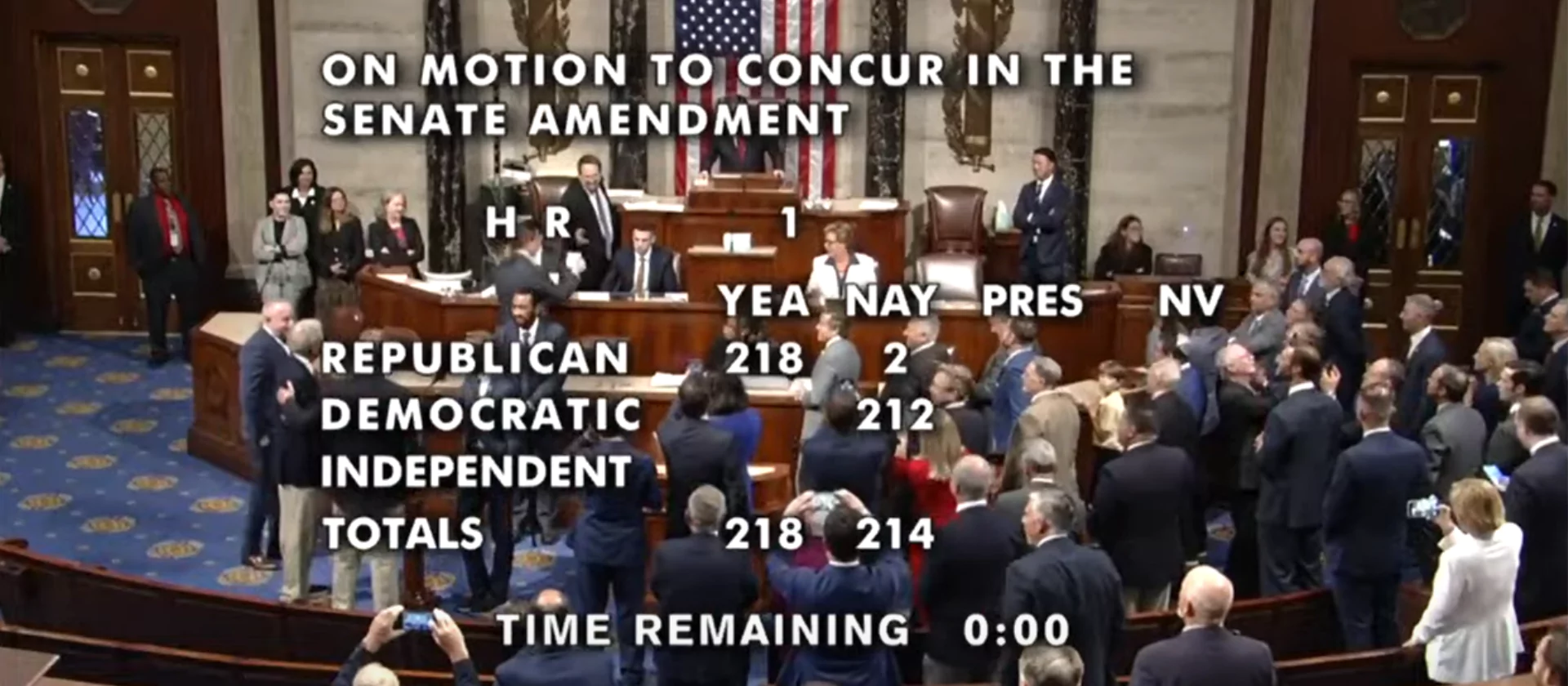Much of the progress Oregon has made in expanding health care access is at risk as a result of the federal budget reconciliation bill enacted by Congress. In this episode of Policy for the People, we discuss the past, present and future of Oregon’s system of health care, including the threats posed by the federal budget reconciliation bill. Our guest is Dr. Bruce Goldberg. Bruce is a professor at the OHSU-PSU School of Public Health and a nationally recognized health policy expert.
Listen to prior episodes of the show
Transcript
We make this transcript available for your convenience and to increase the accessibility of our content. The transcript was generated by software and was slightly edited for clarity. If you are able to, we encourage you to listen to the recording.
Juan Carlos Ordóñez, host: “Oregon reaches a historic number of people with health coverage.” That was the headline from a news release put out by the Oregon Health Authority last September.
The news release reported that in 2023, the share of Oregonians with health insurance reached 97%, the highest level ever. That figure represents progress, significant progress, over the past decade and a half. Back in 2011, before the Affordable Care Act took effect, the share of Oregonians with health insurance stood at about 85%, so about 12 percentage points less than where we are today.
The Affordable Care Act was not perfect. Today, some Oregonians still don’t have health insurance. And for many others with health insurance, the cost of health care is still far too high. Still, it’s undeniable that the Affordable Care Act and the steps Oregon took to maximize the benefits of that law did a lot to expand access to health care. But now much of that progress is at risk. It’s at risk as a result of the federal budget reconciliation bill enacted by Congress in early July, the so-called One Big Beautiful Bill.
In this episode of Policy for the People, we discuss the past, present and future of Oregon’s system of health care, including the threats to it posed by the federal budget reconciliation bill.
Our guest is Dr. Bruce Goldberg. Bruce is a professor at the OHSU-PSU School of Public Health and a nationally recognized health policy expert. Among his many accomplishments, Bruce was the founding director of the Oregon Health Authority. He has also served as director of the Oregon Department of Human Services. I should add that Bruce is a board member of the Oregon Center for Public Policy, which produces this show.
Here is my conversation with Dr. Bruce Goldberg.
Juan Carlos: I want to start by going back a few years to 2022. And that year, Oregonians put into the state Constitution the following language: “It is the obligation of the state to ensure that every resident of Oregon has access to cost effective, clinically appropriate and affordable health care as a fundamental right.” I’m wondering, how close or how far are we from fulfilling that obligation of ensuring that everybody has access to affordable health care that is clinically appropriate?
Bruce Goldberg: It’s a great question. You know, the impetus for that bill was Representative Mitch Greenberg, who fought many years to get that to happen. We’re not there yet by any means. In fact, we’ll talk more about this later. We’ve taken some steps forward, but we’re now taking a few steps backwards. Not everybody in our state has affordable health care that meets their needs, and that’s something we need to keep working on.
Juan Carlos: So if we go back farther still, 15 years ago Congress enacted the Affordable Care Act, which was at the time one of the biggest changes to our system of health care here in our country. What were the main changes that the Affordable Care Act enacted, and to what extent did it improve the health care system for Oregonians?
Bruce: Well, the Affordable Care Act was an amazing advance both for our state as well as for the country. And it did a couple of things.
One, it greatly reformed our health insurance market. People forget this now, but it used to be that you could be excluded from health insurance if you were sick, and health insurance didn’t cover certain preexisting conditions. All that went away. Now, insurers had to issue you a, health plan. They couldn’t say, “Well, we’ll cover you, but you have diabetes, so we’ll cover you for everything except the thing that you need health insurance for.” So I was just a huge change. So first, it guaranteed coverage. Second, it created an essential benefit that all health insurance needed to cover. So that was great. It banned lifetime limits on health care coverage. And it had some preventive care at no cost. So there were some great insurance market reforms.
And then there were some really great things to help people get access to health care. More people got health insurance because of the Affordable Care Act. And it did two big things. It expanded Medicaid so that now Medicaid could cover people up to 138% of poverty. And it also created the insurance marketplace, where people above 138% of poverty could buy health insurance, and they could get some premium tax credits and cost sharing help. So it really helped get people more health care. Here in Oregon, we added over 200,000 people to the Oregon Health Plan.
We saw the number of people who were covered by health insurance go up from the low 90th percentile to up about 95, 96%. So all of that great. But this gets to the point you raised, Juan Carlos, about where are we in terms of getting everyone affordable health care. You know, we still have a problem. And that problem is that health care is too expensive and that many people have high deductible plans and two thirds of people who are bankrupt say medical bills are the primary cause.
You know, 20 million adults owe health care debt. Three million adults in the country, over $10,000. And because of that, people delay getting care, or they don’t get care because they’re afraid they’re going to owe. And that’s because we’ve got a lot of high deductible plans that cost people. The deductible is three, four, five, $7,000 a year, which for low income families is not affordable.
So we’re a long way from reaching what Representative Greenlick thought we needed, which was where everybody in this state has affordable health care. We’ve got people who have some health care coverage, and certainly now 97% of people in the state have health insurance coverage. But for a lot of people, it’s not adequate. And even with health care coverage, they go bankrupt.
Juan Carlos: I wonder if you have a sense of who it is that remains outside of coverage, what population still tends to lack health insurance, and also what population tends to suffer the most in terms of this issue of medical debt and is struggling with the affordability of health care.
Bruce: Minority and low income communities are disproportionately affected, both by medical debt as well as, those are the populations that have the highest rates of insurance. So that’s one big piece of those who are uninsured. There’s a group of people who choose to be uninsured. They don’t sign up. Those are big groups.
Juan Carlos: Some of the reforms in the Affordable Care Act were optional for states. For example, states could choose whether or not to expand Medicaid coverage in their states. How well did Oregon do in terms of maximizing the benefits of the Affordable Care Act? And also, compared to other states, how are we in terms of expanding health care access?
Bruce: So what with what the Affordable Care Act did was, initially, mandate that all states expand Medicaid up to 138% of poverty. It turned out there was a court case about that, and that was no longer a mandate. And it became an option. About 38 states took up that option. Still, a number of states didn’t. Oregon obviously took up that option. And we cover people up to 138% of poverty in our Medicaid program. And we did an incredible job in outreach. You know, it isn’t just saying on paper that you cover people. It’s really getting the word out. It’s having application assistance. It’s creating applications that are easy. There’s a lot that goes into getting people covered. And Oregon is in the top tier of states in getting people covered.
And recently we’ve gone beyond simply getting people on Medicaid. We’ve created health care coverage for people who are not citizens, who wouldn’t qualify for Medicaid based on not being citizens. And we now cover them through a number of programs for kids and adults. So we really lead the nation in covering people in our health care system.
Juan Carlos: So the Affordable Care Act fell short of ensuring that everybody has access to clinically appropriate, affordable health care. What structural factors made the Affordable Care Act fall short? What was it that made it insufficient?
Bruce: Well, I think a couple of things. I mean, it went a long way and it’s been a great thing. And I think we can, we can’t underestimate that at all. The hundreds of thousands of people in Oregon that have benefited from the Affordable Care Act has been just remarkable.
But putting that aside for a moment, I think where it fell short was in a couple of areas. The insurance marketplace creating the high deductible plans, that clearly is a place where we could see some improvement. And, obviously the other place where the Affordable Care Act didn’t do enough, but we’ve taken on that task here in Oregon and has done very well, was covering individuals who would otherwise qualify for Medicaid except for citizenship. It’s another place where the Affordable Care Act fell short. You know, the other place that we fell short was in our small group market and how we could create an affordable, small group market. We still have many people that work for small businesses. Many of them can’t afford to cover their workers. That’s another place where we need to and could do better.
Juan Carlos: You mentioned the issue of medical debt earlier, how it remains a big problem. Has that problem been growing in recent years? Has it remained stable and it just has been a persistent problem? How would you characterize it?
Bruce: No, it’s been growing. And it’s been growing because of what’s been happening in our health care system. Because health care is so expensive, some of those costs are being shifted to consumers. And we’ve seen an incredible increase in the cost shifting to consumers. We’ve seen more and more high deductible plans. We’ve seen more and more co-pays and co-insurance.
So more of the cost of health insurance has been shifted to consumers, and that’s led to more and more bankruptcy. Again, the amazing statistic is not only are two-thirds of personal bankruptcies in the country due to medical bills, but most of those people are insured. So we have people who have health insurance who are going bankrupt, declaring personal bankruptcy because of medical bills.
They’re losing assets like their homes. They’ve got damaged credit. It’s a real problem and it’s really increasing. And it’s something we need to pay a lot of attention to.
Juan Carlos: Shifting gears here, in July, just very recently, Congress passed by the narrowest margin a massive budget reconciliation bill known as the One Big Beautiful Bill. And the bill really amounts to a massive set of tax cuts that mainly flow to the most well-off, paired with cuts to health care and nutrition assistance. Can you walk us through the main changes that the reconciliation bill makes to our system of health care?
Bruce: Yeah, we started by speaking about the Affordable Care Act and the Oregon constitutional amendment, all these things moving us forward in terms of covering people, getting them affordable health care. Unfortunately, this reconciliation bill takes us a step backwards. And it does that in a number of ways.
The first thing is in state Medicaid financing. We use, as many states do, a provider tax to help us pay for our Medicaid program. And what the reconciliation bill does is it dials back the ability of states to use a provider tax where we’ve up until now been able to tax 6% of the gross receipts of a hospital or health providers. That’s being ratcheted down to 3.5% over a series of years. Without getting into all the gory details, what that does is that the state is going to lose $870 million in federal funds in the 2027-2029 biennium. It’s going to lose $11 billion over ten years.
So what that means is that we’re going to see less federal money coming to the state for health care, for Medicaid, and we’re going to have to find that money somewhere. And that means either raising taxes, less money for schools, or public safety. It’s going to create a huge budget problem for the state. So number one, this really decreases federal support for Medicaid in its simplest way that’s a big thing. We’re going to lose $11 billion of federal money over ten years.
The other thing it does is it makes a variety of changes to how the Medicaid program works, which to cut to the chase, really will have the effect of several hundred thousand people losing coverage here in Oregon. Those changes are, number one, starting in December of next year, 2026, there’s going to be work requirements for several hundred thousand people on Medicaid. They’ll need to demonstrate that they have 80 hours of work or some other qualified public service or other activity. What we’ve seen in other states that have instituted work requirements in the past is that, in essence, it keeps people from signing up for Medicaid because it creates a lot of bureaucratic hoops for them to jump through. It doesn’t increase employment and it decreases people getting health care. So, that’s one issue.
The second issue is, People now will need to reapply for Medicaid every six months. Right now, adults reapply every two years here in Oregon and would re-enroll every six months. This means that people will fall off the health plan because, unfortunately, signing up for Medicaid is often difficult. People have a hard time understanding the application and they don’t get notices. They don’t have permanent addresses. They’re migratory. For a host of factors, many, many people will fall off of Medicaid. They’ll lose coverage, and the state will lose federal support for Medicaid over $1 billion a year. The bill will also require cost sharing for some people, low income people, $35 a service for some adults.
So those are the big changes to Medicaid that will, in essence, will lose billions of dollars of federal support and several hundred thousand people will fall off of Medicaid. It will result in more uncompensated care for more uninsured people coming to the hospital and to the doctor. The cost of that will be shifted on to the rest of us. It will create a terrible, terrible cycle.
And then the last piece is the marketplace that we talked about earlier, where people who are working above poverty can buy health insurance and get premium credit. Some premium subsidies are going away. That means certain people will pay an average of almost $1,000 a year more for health care.
What that will do is it will push healthy people out of the insurance market. Many people will make an economic decision: “I’m healthy. I don’t need health insurance. I can’t afford to pay another thousand dollars a year. So I won’t go. I’ll go without health insurance.” What that means is that the pool of people in that market will now be a pool of very sick people who need to pay that money because they have a lot of health care expenses that will boost the costs of a health insurance premium. So we’re just going to see a huge cycle of more people uninsured that will lead to rising health care costs.
We’re going to lose federal support, and it just takes us backward. And it’s really, really sad. As someone who worked hard building a state system that tries to cover everybody with affordable health care, and we’ve been able to celebrate milestone after milestone of getting better and better over the last ten, 15 years, this really takes us backward. And, I think it’s going to affect everybody in the state, regardless of whether you’re insured or if you’re on Medicaid or in the marketplace. It’s going to have an effect on everybody.
Juan Carlos: As you said, Oregon is going to take a big hit financially in terms of the federal support it receives for health coverage in the state. Can Oregon maintain the existing level of health coverage? What would it take to ensure that Oregonians don’t lose access to health care? Is there a way to accomplish that?
Bruce: Well, I think this is what a lot of us are thinking about, working on right now. Losing $1 billion in a biennium. How do you make up for that? And, you know, I think that we can do some things to help make the Medicaid system more cost effective. We can streamline Medicaid. I think there are some things that we can do. But I think it can be really hard. And, I think that it will still mean that a lot of people are going to lose health care coverage.
Juan Carlos: So for several years now, the state of Oregon has been working on developing a plan for universal health coverage. And in fact, the legislature created the Universal Health Plan Governance Board, which is tasked with developing a plan for how to finance and how to run a universal health plan. And you are a member of that board that is developing the plan. I’m wondering, given the damage that the reconciliation bill does to our system of health care, is there still a path there for Oregon to reach universal health care?
Bruce: I believe there is. I believe that, eventually, we will create a system where everybody in this state gets the health care that they need and have a health care system that’s affordable. This bill sets us back because it creates more people who will lose coverage. On the other hand, I think it shines a light on the problems with our health care system and demonstrates the need for a more affordable system.
You know, I’ve just seen our health care system get so much more complex and complicated. I think we’re reaching a point where everybody is starting to realize that we need to have a simpler system that covers everybody. We get notices of coverage that none of us understand from our health insurers. We have doctors and hospitals and health insurers that have offices chock full of people doing prior authorization and administrative functions that add very little value to our health care system.
I just think we’re getting to the point where more and more of us are realizing that our system’s broken and we need to change it. So in a certain way, the reconciliation bill takes us a step back. In another way, it highlights the need for a simpler, cost effective system that covers everybody. So I think there’s many more chapters to be written in this book
Juan Carlos: For Oregonians who yearn to see a system where everybody has access to affordable, quality health care. What actions can they take? Do you have any words of wisdom to share with them?
Bruce: Yeah, I think people can get informed about our health care system and the changes that are necessary. I think that they can follow the universal health care governance board. I think they can talk to their legislators. I think they need to get involved in the political process that has people working towards health care for all. So I think that people need to be in get involved in the political process in the state.
Juan Carlos: And perhaps the recent changes, the massive cuts enacted, will galvanize some of that support.
Bruce: I think that’s the hope. I mean, I think that perhaps, maybe a little bit of the silver lining.






